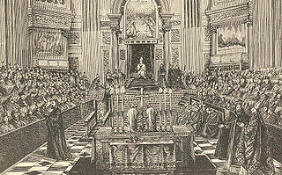
A Manual Of Councils Of The Holy Catholic Church -Rev. Edward H. Landon. M.A.
J
JASSY (1642). Held at Jassy, in Moldavia, in 1642, under Parthenius, Patriarch of Constantinople. The eighteen articles of the confession attributed to Cyril Lucar were condemned, and the orthodox confession of Peter Mogila, as revised by Meletius Syrica at Constantinople, examined and approved; three prelates and several priests were present.
JACA (1063). [Concilium Jaccetanum.] Held in 1063. In this synod the See of Huesca was transferred to Jaca, and the Roman ritual introduced to the place of the Gothic.—Tom. ix. Conc. p. 1111. See Florez, Esp. Sag. tom. iii. 288, &c., and xlvi. 164.
JERUSALEM (50). [Concilium Hierosolymitanum.] The FIRST ecclesiastical council was that mentioned in the fifteenth chapter of the Acts of the Apostles; it was assembled at Jerusalem about the year 50, under St James the Less, Bishop of Jerusalem, in consequence of the schism in the Church of Antioch upon the subject of circumcision, stirred up (it is probable) by Cerinthus. St James pronounced the decision of the council, which charged the members of the Church to abstain—
1. From meats which had been offered to idols.
2. From blood and things strangled.
3. From fornication.
The first of these prohibitions is plainly directed against the slightest participation, even in appearance, with the idol worship of the heathen.
The second appears to have been intended to prevent offence to the Jewish converts, and to draw together the Jews and Gentiles.
The third was directed against the prevailing vice of the Gentile world.
JERUSALEM (349). Held in 349, by Maximus, Bishop of Jerusalem, and about sixteen other bishops, upon the return of St Athanasius to Alexandria after the death of the intruder Gregory. In this council the Bishops of Palestine and Syria received Athanasius with great respect, and professed deep regret for having formerly been compelled to sign the decree against him; finally, they drew up a synodal letter to the Church in Alexandria, signed by sixteen bishops, fifteen of whom were the same as signed at Sardica.—Tom. ii. Conc. p. 724.
JERUSALEM (399). Held in 399, in consequence of a synodal letter received from Theophilus of Alexandria, making known the decree which he had passed in council against the Origenists. The bishops of the Patriarchate of Jerusalem replied by a common letter, in which, having expressed their grief for the evils which the followers of Origen had caused to the Catholics, they assured Theophilus that they agreed in the above-mentioned judgment. And concluded by stating their resolution not to admit to their communion any whom he had condemned for believing the Son to be, in any sense, inferior to the Father.—Mansi, Supp. tom. 1. col. 271. (See C. ALEXANDRIA and CYPRUS.)
JERUSALEM (453). Held in 453, upon the re-establishment of Juvenal, and expulsion of Theodosius. Juvenal, who had been deposed for his concurrence in the oppression of Flavianus in the Latrocinium at Ephesus, was afterwards, in the œcumenical Council of Chalcedon, restored. But during his absence a monk named Theodosius, a zealous advocate of the Eutychian heresy, taking advantage of the opportunity, published various calumnious statements against the Council of Chalcedon, and prejudiced both the Empress Eudoxia and all the monks of the patriarchate against Juvenal; by such means he succeeded in intruding himself into the see of Jerusalem; and for twenty months he retained possession of it, committing every kind of excess and wickedness. In this year, however, the Emperor Marcian re-established Juvenal, and Theodosius fled to Mount Sinai.
JERUSALEM (518). Held in 518, under the Patriarch, John III., composed of thirty-three bishops, gathered from the three Palestines. All the acts of the Council of Constantinople were confirmed, and the Severians and Eutychians condemned, in a synodal letter addressed to John of Constantinople.—Baronius. Tom. iv. Conc. p. 1588.
JERUSALEM (536). Held in 536, September 19, under the Patriarch Peter, composed of forty-five bishops, who approved the acts of the Council of Constantinople of the same year, in the matter of Anthymus, Patriarch of the latter see, and a Monothelite, who had been deposed, and Mennas elected in his stead. Severus, Peter, and Zoras, and other Acephalists, were also condemned.—Tom. v. Conc. p. 275.
JERUSALEM (553). Held in 553, in which all the bishops of Palestine received the acts of the fifth œcumenical Council at Constantinople, with the exception of Alexander of Abilene, who, in consequence, was deposed.—Tom. v. Conc. p. 739.
JERUSALEM (634). Held in 634 in this council Sophronius, the patriarch, addressed a synodal letter to the different patriarchs, informing them of his election, and urging them to oppose the heresy of the Monothelites.
JERUSALEM (726). Held in 726, against the fanatics, called Agonoclites, who maintained that prayer should be made not kneeling, but standing, or dancing.
JERUSALEM (1443). Held in April 1443, under Arsenius, Metropolitan of Cesarea, in Cappadocia; Philotheus of Alexandria, Dorotheus of Antioch, and Joachim of Jerusalem, being present. It was decreed that no clerk, ordained by the Oriental bishops in communion with Rome, should be admitted to exercise his office in their communion, until he had in the presence of the orthodox bishops satisfactorily proved his piety and adhesion to the faith of the Greek Church.—Mansi, Note to Raynaldus, Tom. ix. p. 420.
JERUSALEM (1672). See C. BETHLEHEM, A.D. 1672.
JUNCA (in AFRICA) (524). [Concilium Juncense.] In the year 524, a council was held at Junca or Junga, in Africa, at which Fulgentius, Bishop of Ruspa, presided. The subject brought before it was the case of Vincentius, a bishop, who had extended his jurisdiction over places which did not belong to his diocese.—Tom. iv. Conc. p. 1627.
Copyright ©1999-2023 Wildfire Fellowship, Inc all rights reserved

 Keep Site Running
Keep Site Running